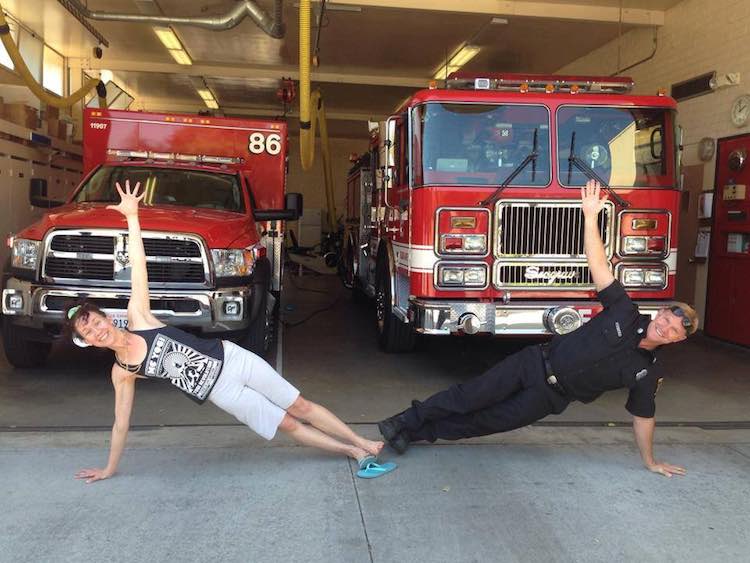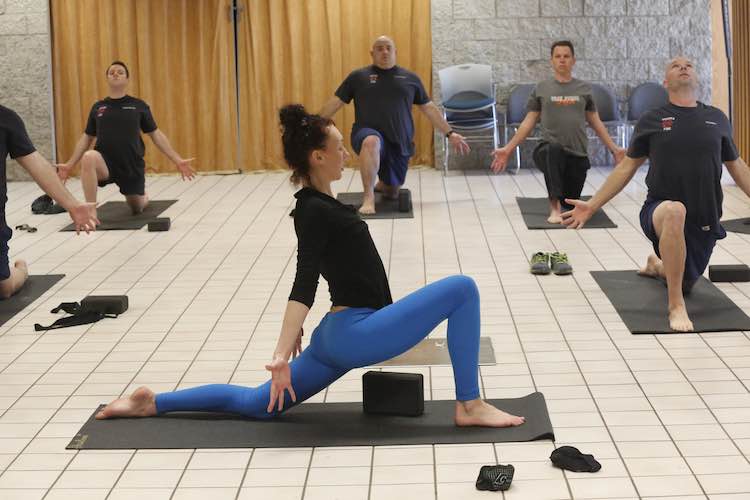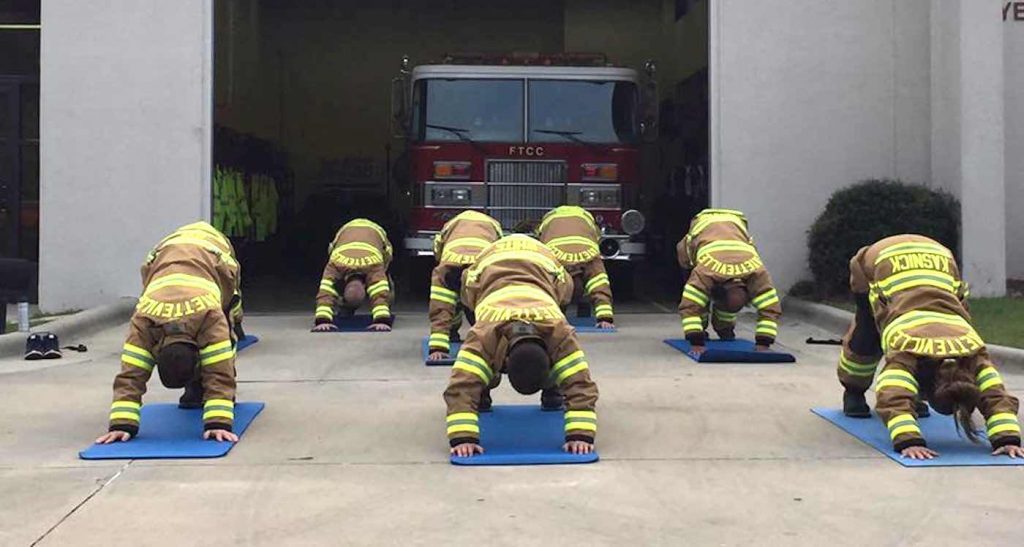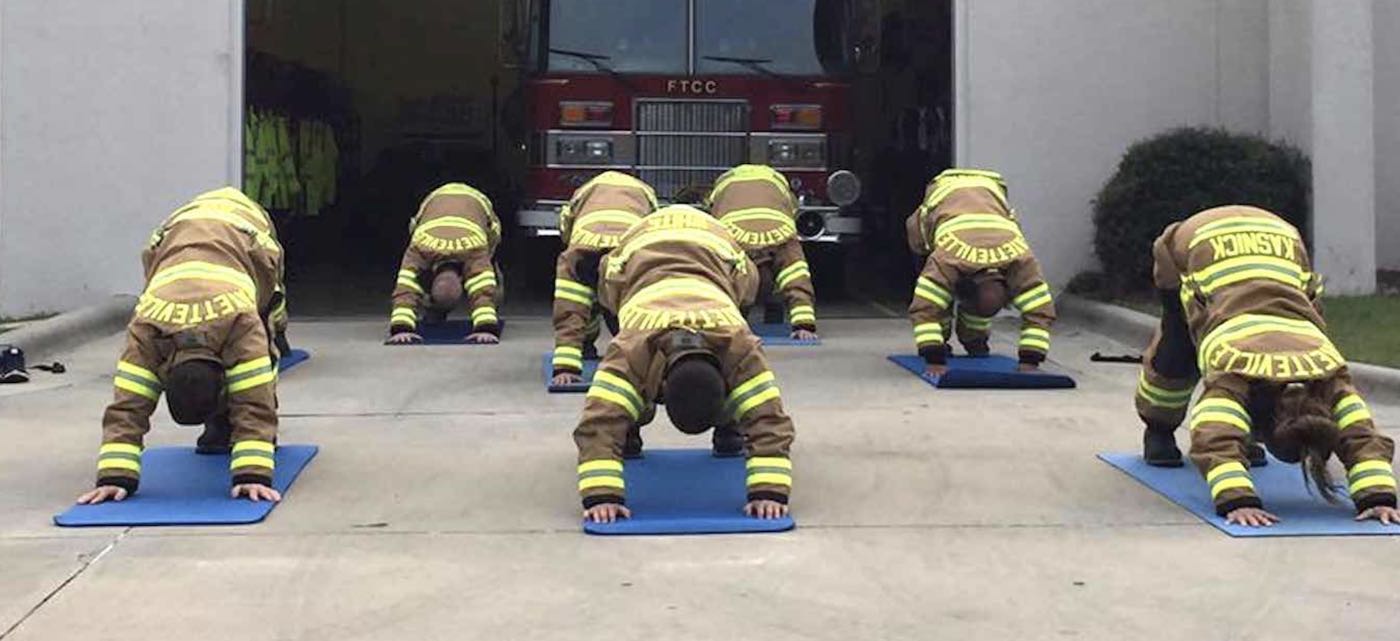Police officers and firefighters across America are coping with the stress of life on the front lines by slipping into a downward dog.
The nonprofit group Yoga For First Responders is teaching these emergency workers a better way to handle the demands of their hazardous jobs.
36-year-old instructor Olivia Kvitne Mead founded YFFR in 2013 after she was inspired by her work with military veterans. If the 5,000-year-old practice could help them with PTSD, then she was certain that first responders could avoid burnout and perform more efficiently at the scene of emergencies.
“There are lots of yoga programs for veterans but they are all focused on after their tours of duty,” said Mead. “That doesn’t happen for first responders. They are in their jobs for 30 years until they retire. They go to work and see trauma, death, destruction, loss and the worst part of humanity, then they have to go home and be a mother or a father, a husband or a wife.”
Mead, who is from Denver, Colorado, believed that yoga could help lower their rate of mental health problems, including depression, anxiety and alcoholism. According to a study from the Ruderman Foundation, more first responders committed suicide in 2017 than those who were killed in the line of duty.
RELATED: First Ever Study Shows Chair Yoga is Effective Arthritic Treatment
“There is a missing skill set in first responder training and that is what is leading to these high statistics of burnout, divorce, alcoholism and suicides,” said Mead. “They need to be taught the ability to handle stress and trauma and process it. Otherwise you are just going to get squished by all the trauma you witness.”
And it’s a good thing that she pursued the idea, because she turned out to be right.

She first contacted the Los Angeles Fire Department in 2013 and pitched her idea to teach yoga to firefighters. “The then-head psychologist of the department already practiced yoga and he knew the benefits – [but] his number one concern was: how are we going to get the alpha male population to do yoga which is marketed as a female, delicate exercise?
“I said that I already taught veterans and I thought I could speak to this group of people.”
MORE: ‘Quiet Time’ Program Brings Radical Improvement To Schools Worldwide
She began to volunteer twice a week at the fire department, showing up every Tuesday and Thursday with yoga mats – and soon, the Los Angeles Police Department joined firefighters in becoming interested in her program, too.
“The behavioral science section of LAPD was hosting a wellness day for their high command staff,” said Mead. “The detectives were not clocking out, working 24/7 and dropping dead of heart attacks left, right and centre. It was almost an epidemic.”
Mead admitted that not all first responders have been eager to get on the yoga mat.

“I worked with one firefighter in Iowa. He was a bigger guy and he didn’t want anything to do with the yoga,” she recalled. “But I came back to the fire department to give weekly classes. When I explained to him that I was here to help him do his job and sleep well afterwards, he changed his mind about yoga. He came to every single class I did.
“I later learnt that he hadn’t been able to sleep a whole night for a year after being called out to a car accident. He told me one day: ‘After your yoga classes, I was able to sleep last night’.”
CHECK OUT: Veterans Are Finding Peace From PTSD Through ‘Float Therapy’
Today, Yoga For First Responders works with 35 police and fire departments across the United States, including in Denver; Wichita, Kansas; and Lawrence, Massachusetts.
The training is also now officially part of the Chicago Police Academy syllabus, meaning every new recruit takes yoga sessions before joining the force.

Mead insisted that yoga not only helps first responders to handle the stress of their job, it allows them to do their jobs more efficiently; especially because teaching deep, controlled breathing allows firefighters to require less oxygen when battling blazes.
“Breath work helps CO2 tolerance in the body,” said Mead. “It means that while a firefighter’s air bottle normally lasts 15 minutes in action, we can make it last longer.
“Yoga strengthens the body and makes it more mobile which is very important for first responders, as their body is their tool—but the true essence of yoga is neurological training.
RELATED: Veteran With PTSD is Creating Free Tiny House Community for Others Like Him
“It trains the mind and the nervous system to withstand anything by teaching breathing techniques and cognitive behavioral therapy.”
The Henderson Fire Department in Kentucky now offers a YFFR class three times a week, and they are seeing “really great” attendance. Lieutenant Josh Dixon came to his first class last November and now practices yoga five times a week.
“We can’t control what goes on outside our body, especially in an emergency,” said the 41-year-old responder. “But you can control what goes on inside.”
(WATCH the video clip — Donate to the nonprofit, or find a location)
Be Sure And Share The Inspiring News With Your Friends On Social Media




















